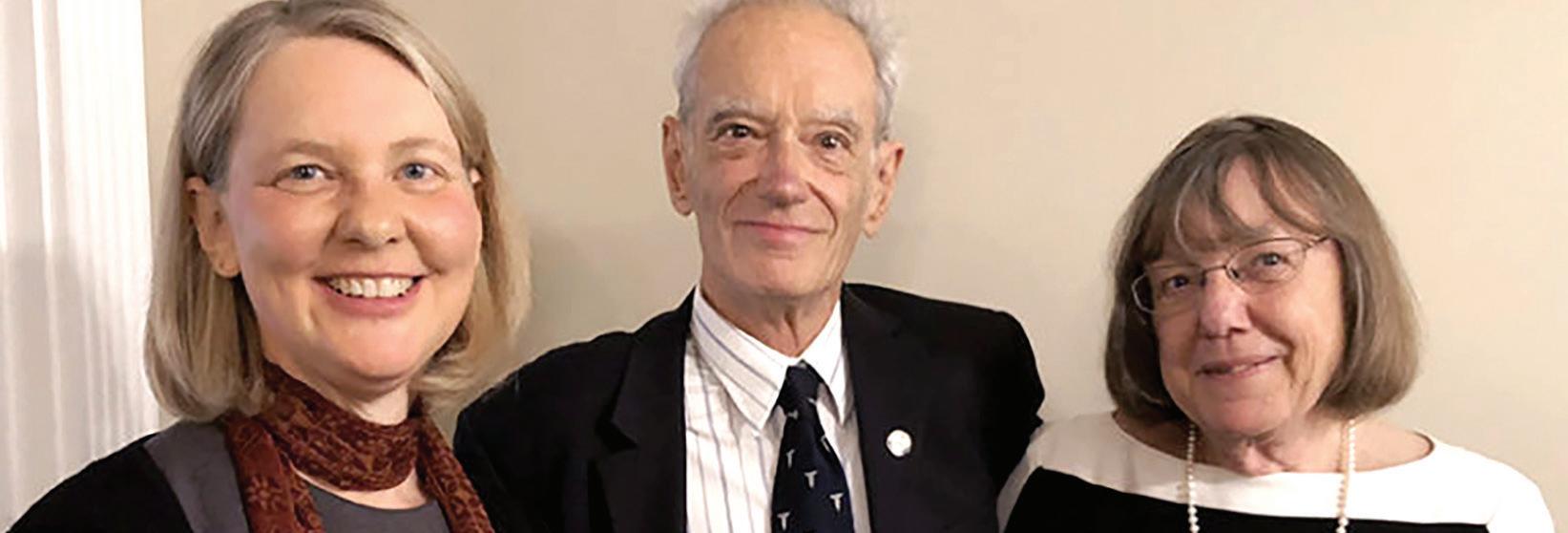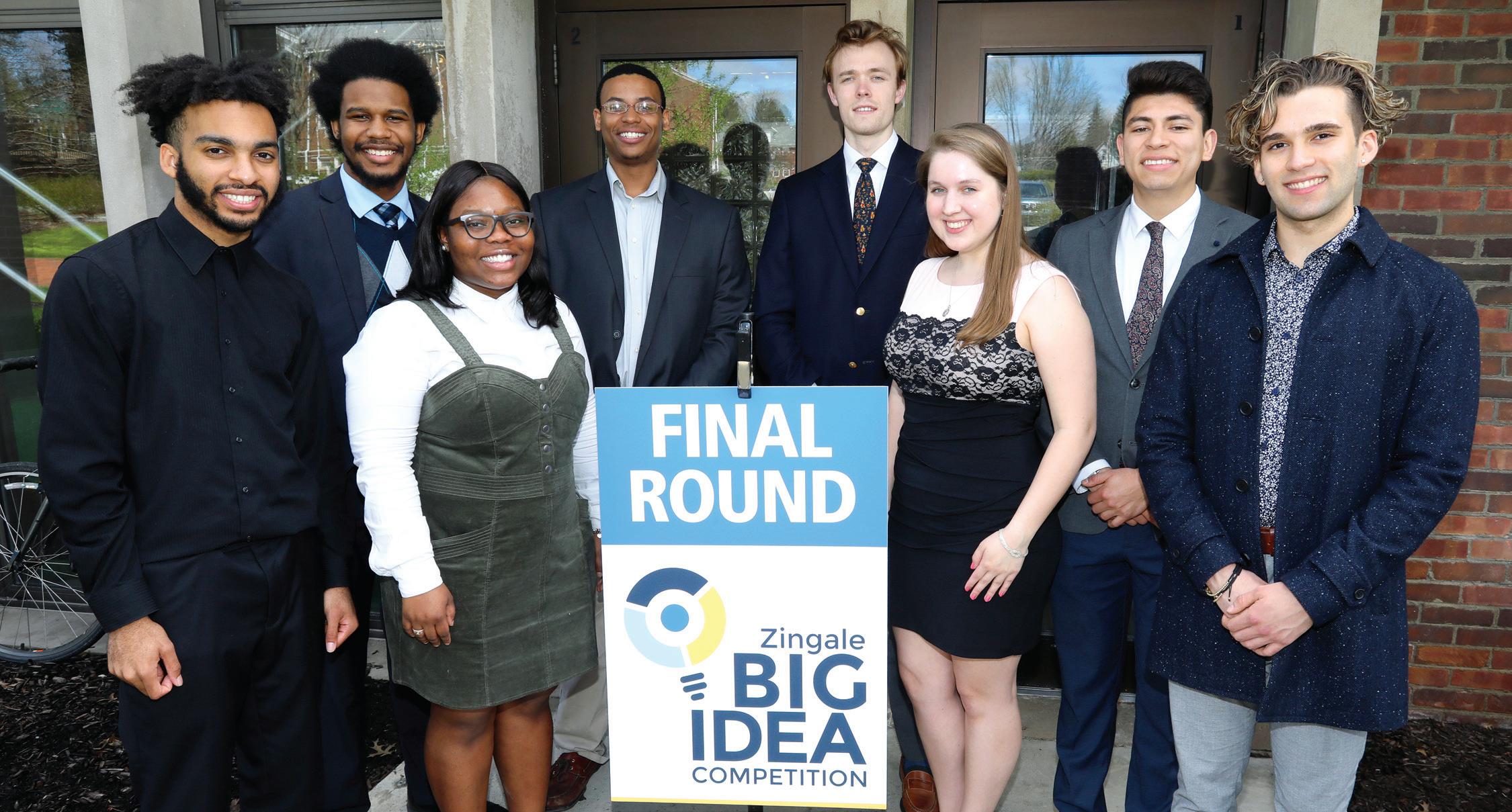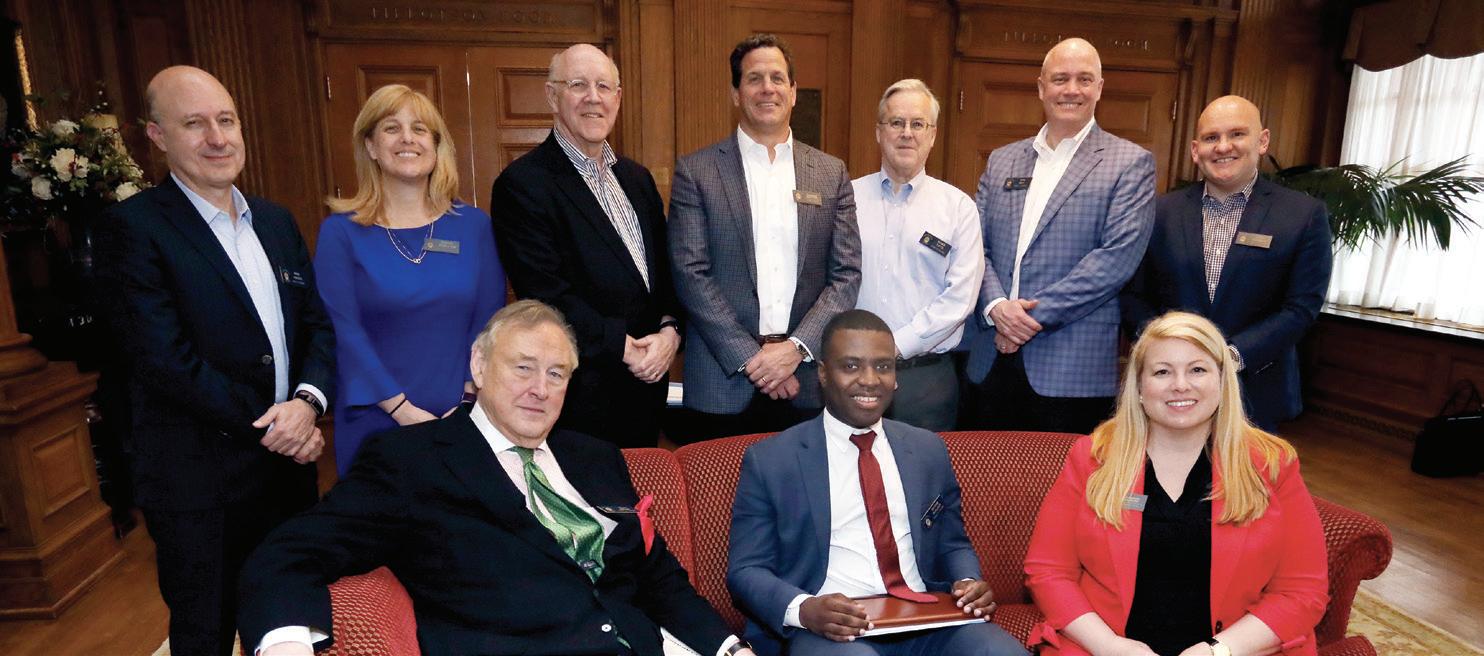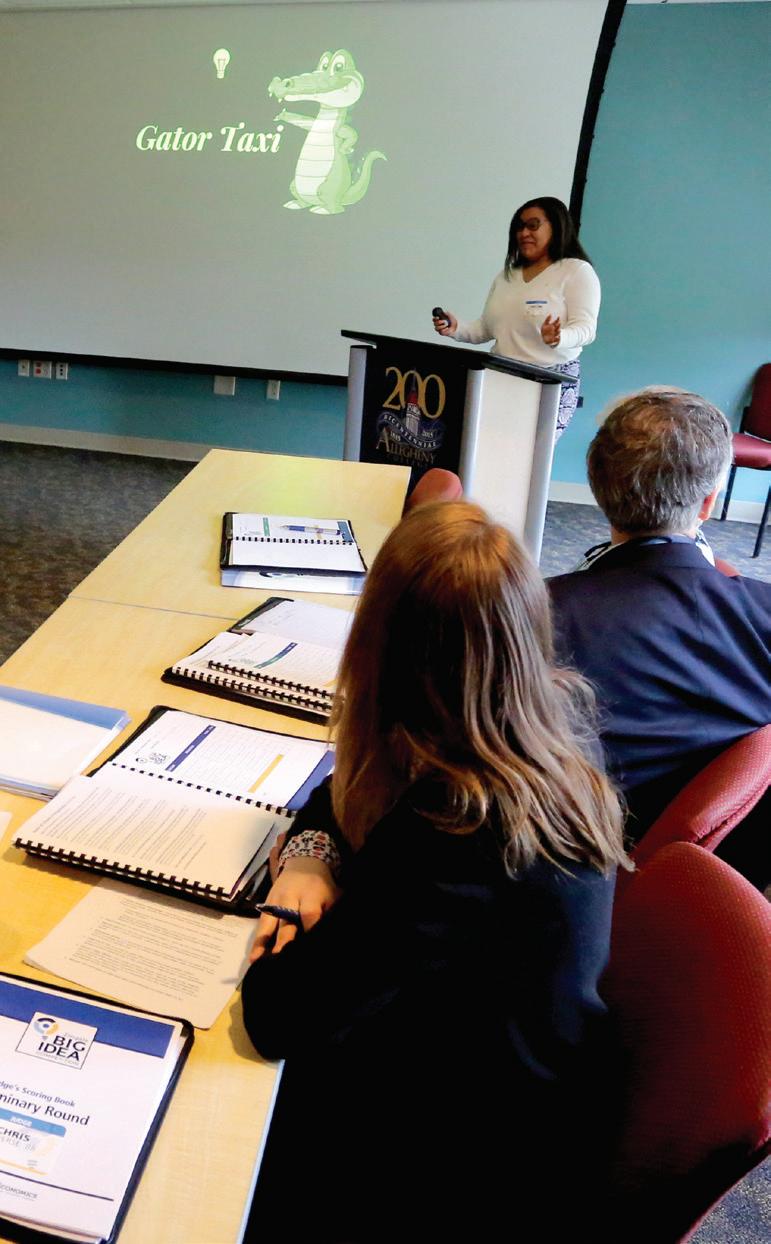
12 minute read
Campaign Adds New Endowed Professorships and
Talk with anyone about their Allegheny experience and, without fail, they will tell you about the world-class faculty who taught, mentored and changed their lives when they were students.
With that in mind, the Our Allegheny: Our Third Century Quest
campaign raised nearly $37.5 million for faculty support to provide funds for professional development, visiting scholars and artists, and student-faculty research, as well as a number of new professorships, supporting academic programs in political science, interdisciplinary studies, economics, environmental science, art, geology, biology and more.
The funds raised for professorships help to recruit and retain faculty and also to give them the resources they need to keep pace with rapidly changing disciplines and student needs.
SOME OF THE PROFESSORSHIPS THAT WERE ADDED DURING THE CAMPAIGN INCLUDE:
The Christine Scott Nelson ’73 Endowed Professorship in Environmental Science
Established by Christine Scott Nelson ’73 Held by Eric Pallant
The Patricia B. Tippie Endowed Professorship in Economics
Established by Patricia Bush Tippie ’56 & Henry B. Tippie Held by Tomas Nonnenmacher ’90
The Eila V. Bush Endowed Professorship in Art
Established by Patricia Bush Tippie ’56 & Henry B. Tippie Held by Amara Geffen
The Robert G. Seddig Chair in Law & Policy
Funded by R. Bruce Dotson P’74 & Paula Dotson P’74 Held by Brian Harward
The Max Kade Endowed Chair in German Studies
Established with a grant from the Max Kade Foundation
The Dr. Sue E. Steven ’75 Endowed Professorship in Biology
From Sue E. Steven ’75 & W. Craig Blasingame P’94 that will be funded by bequest
The Samuel S. Harrison '63 Geology Professorship
From Mary “Missy” Feeley ’78 & Clive Gregson that will be funded by bequest
The Brett ’65 and Gwendolyn ’64 Elliott Professorship for Interdisciplinary Studies
Funded by Brett Elliott ’65 & Gwendolyn Elliott ‘64 Held by Barbara Shaw
(left to right) Barbara Shaw, Brett Elliott ’65, and Gwendolyn Elliott ‘64.
Gwendolyn Elliott ‘64
The Elliotts, of Magnolia, Delaware, contributed an endowed professorship and established a faculty support fund during the campaign.
Adds Brett Elliott, an ophthalmologist: “At Allegheny, I received the two most important things in my life, an education and I found love.” Brett and Gwendolyn met at Allegheny in 1964 in Brooks Dining Hall and married in 1965. “Allegheny taught me to question authority in an intelligent fashion,” says Brett, “to question what you hear in your profession and to question what is going on in society about where we are headed.” Barbara Shaw, associate professor and interim chair in women’s, gender and sexuality studies, interim chair in Black studies, and director of interdisciplinary studies, stays in touch with the Elliotts. Most recently in the fall 2020 semester, she wrote: “With classes in full swing (as I write we are entering week 5 of the semester), I have returned my full attention to crafting an engaging classroom focused on students’ well-being and their learning during these difficult days. Now more than ever, we as faculty play such pivotal roles in students’ lives and mentoring them brings joy and meaning to me. … Thank you again for your generosity — your support continues to be meaningful to me personally and professionally.”
Since becoming director of interdisciplinary studies, Shaw says she is “thrilled to lead efforts with faculty and administrative colleagues to think about how we will more deliberately infuse our curriculum with theoretical and hands-on approaches that support student collaborative learning and problem solving. This work is exciting and builds on the foundations that Allegheny does so well: team-teaching, undergraduate research with students, and community-engaged projects. I’m also developing initiatives with colleagues that work closely with athletic and faculty advisors, admissions and career education so that prospective students, their parents/ guardians, and our current students can better understand why interdisciplinarity best prepares students for their future endeavors.”
Christine Scott Nelson '73, a member of the Allegheny College Board of Trustees, says her interest in endowing a professorship in the Environmental Science and Sustainability Department stems from the 1970s when she was an Allegheny student. “It was then that we created the Environmental Science Department, and it was one of the first in the country in higher
Christine Scott Nelson ’73
Allegheny College Board of Trustees education. Now, students in the last 10 or 15 years are saying climate change is the number one issue for them. So I felt compelled, in many ways with a sense of urgency, to support what we can and provide resources that will help these students achieve the goals that they have for making this a better world to live in. I was thrilled that Eric Pallant was the first recipient of this professorship because he has done so much for our sustainability efforts on campus. It’s not just hearing what Eric has done, but hearing what his students have done and what he has accomplished with his students. It just brings it all alive. It’s so important.”
Nelson also was a major donor for the renovation of Carr Hall and establishing the Richard J. Cook Center for Environmental Science. “We were improving Carr Hall in order to bring classrooms and labs up to state of the art and to really make this a showcase for a department that is very important to Allegheny and very important to our students,” Nelson says. “It was also a way for me to honor President Emeritus Richard Cook, who spent a lifetime engaged in issues of sustainability and, similarly, funding an endowed chair for the environmental science program was a way for me to honor the faculty who so inspire our students and mentor them.”
Pallant, in turn, says he is honored to have received a second five-year period to hold the endowed professorship. “Being affiliated with Christine Scott Nelson, who I think of as being one of the most solid, quiet, unknown environmentalists I’ve ever met, and to have that nomenclature in front of my name, I know what it means because I know what she is about," Pallant says. "She is really about commitment to the environment, commitment to making a difference and she’s doing it. She asks, ‘Is this going to make a difference?’ And when she decides that it will, she puts her money where her beliefs are and does it very quietly without a lot of fanfare. To have that association with her just means the world to me.”
Students Capitalize on Professional Experiences, Alumni Involvement in the Bruce R. Thompson Center for Business & Economics

Bruce Thompson ’86

Allegheny College Board of Trustees

Allegheny students, faculty and staff toured the Federal Reserve Bank during a January 2019 trip to Cleveland, where they also attended a banking and finance panel and a networking lunch with Allegheny alumni.
Bruce Thompson ’86 credits his Allegheny College education with providing the knowledge and skills he needed to secure his first job in the financial industry and excel at a top business graduate school. As his career progressed, the Bank of America vice chairman saw an opportunity to help his undergraduate alma mater give today’s students even more of an advantage as they enter the global marketplace.
Thompson, an Allegheny trustee, made the lead gift to support the College’s Center for Business & Economics (CBE) during the Our Allegheny: Our Third Century Quest campaign. The center, which is named in Thompson’s honor, seeks to “attract Allegheny’s next generation of business innovators and entrepreneurs by providing a host of co-curricular activities that connect with and deepen their classroom experiences.” “My efforts have been directed at how we take this wonderful college and create programs that, still with a strong foundation of liberal arts, prepare students for jobs that they are excited about,” Thompson says. “These opportunities hopefully give students every opportunity to succeed and compete at the highest level as they pursue their professional endeavors.”
The CBE’s programming includes major city trips where students can explore internship and entry-level opportunities, interview for open positions and meet with successful Allegheny alumni. Thompson has sponsored those trips for students to New York City and Cleveland. He says he recalls his own experience of interviewing for jobs in the city as a young professional, unfamiliar with what to expect and how to navigate the area. The CBE also brings a wide range of accomplished professionals to campus for presentations and mentoring and networking opportunities with students. Among the center’s most engaged volunteers are members of the Board of Visitors, an advisory body of alumni and business leaders. They interact frequently with students and return to campus for an annual mini-conference designed to help students to use their college experience to achieve their career goals.
Alex Abadi ’21 says he has benefited greatly from his connections with the Board of Visitors and other Allegheny alumni. “Because they’ve been in the workforce for a while, they can speak to the role Allegheny has played in helping them find who they are and how they can maximize their skill set and potential to really thrive in the work that they’re doing,” he says.

The finalists in the 2019 Zingale Big Idea Competition, a funding request contest in which students present concepts in one of three areas: for-profit businesses, nonprofits and hybrid social ventures
Abadi, an economics major and computer science minor, also serves as a CBE fellow. The students in this leadership group support CBE programming and act as student ambassadors. CBE Fellow Rachel Tobler ’21 says she has enjoyed mentoring students and working with faculty, staff and alumni in the role.
Tobler adds that Allegheny graduates have helped her to explore options for certifications after graduation, including the Chartered Financial Analyst exam. “They’re the ones who opened up my eyes to the different options that they had,” Tobler says.
The College introduced a business major beginning with the 2018–19 academic year, expanding upon the business/managerial track offered within the economics major for 18 years. While an important component of the business major, the CBE continues to provide opportunities for students across campus.
“We’ve been careful to make sure that the resources of the center are made available to the overall Allegheny community,” Thompson says. “It’s not something that’s meant to be just economics and business. It’s something that’s meant to be Allegheny.”
Tomas Nonnenmacher ’90, Patricia Bush Tippie Chair of Economics, says that two competitions illustrate the campus-wide appeal and the applied nature of the CBE’s activities: the Financial Literacy Challenge and the Zingale Big Idea Competition. Both were founded by Chris Allison ’83, CBE co-director, entrepreneur-in-residence in
Alex Abadi ’21

Members of the Center for Business and Economics Board of Visitors returned to campus in April 2019 to share their expertise with students.


During the Zingale Big Idea Competition, a panel of distinguished judges not only evaluates students’ business plans but also provides them with constructive feedback and mentoring.
the Economics Department and Allegheny trustee.
In the Financial Literacy Challenge, students from a wide range of majors develop a personal financial budget and investing plan appropriate for life after graduation, Nonnenmacher says. “Constructing this plan not only lets students use some of the tools that they have learned in their finance and accounting classes, but it also puts them on the path of having a sound financial plan,” he explains.
During the annual Zingale Big Idea Competition, student teams from across academic disciplines present entrepreneurial concepts with the chance to receive funding through cash prizes. Recent winners of the competition have included a student majoring in studio art with a psychology minor, an applied computing and economics double major, and a neuroscience and psychology double major.
The competition is named in honor of Lance Zingale ’77, who, along with his wife, Karen, gave generously to support the initiative and also serves as one of its judges. He is chief customer officer, executive vice president and general manager, major markets, at Sykes Enterprises Inc. Zingale says that the Big Idea Competition helps students apply what they have learned in the classroom and demonstrate their entrepreneurial and leadership skills.
The competition consists of two rounds of presentations, says Nonnenmacher. “Students are encouraged to revise their presentations between the two rounds using feedback from the judges. Many of the judges are alumni of the College, giving students the opportunity to network with alumni,” he adds.
Zingale says that the next groundbreaking innovation in business or social initiative benefiting thousands of people could originate with an Allegheny student. And he hopes the Big Idea Competition helps to catalyze that process.
“This is my small way of helping maybe inspire that spark that initiates it all from the very beginning,” Zingale says.
Abadi says that he is “extremely grateful” to alumni like Thompson and Zingale for not only their financial support but also their dedication to helping students.
“Alumni have always been open to answering any questions we have and sharing how they’ve used what they learned at Allegheny in the real world,” Abadi says. “I hope that, when I graduate, I am in a position where I can give students advice on how they can be the best version of themselves that they can be as well as how they can use their Allegheny education to help them do that.”
Lance Zingale ’77
CBE Board of Visitors










